T.R. Hummer's Blog
September 10, 2010
Emissary (V)
 photo by T.R. Hummer
photo by T.R. Hummer9/10/10
Within a few days the desert light has re-clarified itself, sloughing off storm fronts and their aftermath. What was once empty and had become full has emptied itself again. How many times in the course of a life can a consciousness rise out of its own ashes?
*
The emissary sits in the shade of a vast Chilean wine palm brought at unmentionable expense from a distant continent to grace the Emperor’s arboretum. He recognizes the tree from his studies, which were undertaken over decades to equip him for his journey to the Emperor, and consisted of all possible knowledge about the route to the Emperor’s palace, about the Emperor himself—insofar as knowledge about the Emperor is allowed—and about the Palace and its grounds, including the name and history of the tree in question. As he recognizes the tree, the knowledge leaves him. He has no further use for it.
*
Life increasingly becomes attenuated—as if the passage of time (whatever time is) through a human psyche had a caustic effect, scrubbing impurities away. Logically, the opposite would appear more likely—that one would begin life “clean” and accumulate clogs in the psychic plumbing. But the discipline of farewell enters here: the knowledge of one’s own fragmentary incompleteness presses toward the desire to live invisibly, humbly, quietly, on one’s knees in respect to the mystery that is about to swallow one up.
*
A man, a woman, in the middle of life, in the middle of a relationship mellowed or decayed by time, in the middle of a fissioning universe. Precision of the atom. The poisonous glow of the lyric.
*
Sometime in the mid-1980s, I heard the poet Stanley Kunitz begin a public reading with the phrase “I will now read a poem I wrote fifty years ago.” At the time I was in my mid-thirties, and was stunned by the presence of such longevity. It was not that Kunitz was so old, but that he had written poems consistently and devotedly for so long: it was the continuity that amazed me. At sixty, I am still not old enough to begin a public reading of my own work with that phrase, but I do have poems I cannot remember having written. I recognize them as old friends, but where they came from is beyond me. Literally.
*
The emissary examines with great care all the objects he carried with him to sustain him on his journey. He wraps them in a piece of yellow silk and takes them out into the garden, where a beggar sits beside the gate. Without a word he hands the bundle to the beggar. These objects—all he owns in the world—were for the journey here; where he next goes, they will be of no use to him. But to the emissary’s surprise, the beggar speaks. “Everyone strives after the law,” he says, “so how is it that in these many years no one except me has requested entry?” For the first time in a very long time, the emissary smiles. “You’re from the tale by Kafka, are you not?” The beggar thinks a moment, and then nods. Bending down, the emissary kisses the beggar on the forehead. “Bless you, my opposite,” he says, “my brother.”
*
Everyone who contemplates the question of death is equalized in human ignorance. No one is privileged here, not even those who have had what we call “near death experiences,” since nothing objective can be established from such accounts. Though there are virtuoso practitioners of death, we have no geniuses in the epistemology or phenomenology, or—if it is not too paradoxical a category—the ontology of death. And so? The meditation devolves at once to the crucial forking of possibilities: 1. when we die we are gone; or, 2. when we die we go on going.
*
E.M. Cioran writes that “the only corpse from which we can gain some advantage is the one preparing itself within us.” My father, no student of Cioran, understood this. I conclude, in the absence of direct influence either way, that my father and Cioran had the same teacher.
*
When I go out to visit the mailbox, I notice, without surprise, that the palm fronds are gone. The bulk collection has left nothing but clean gravel where the bundles lay. They have passed from the circle of my perception without a trace. They were expressions of something, quite literally: of the tree, of nature, of the universe, call it what you like. They were expressions, in the strictest sense of the word, of Being, a pressing outward. As such, they were my siblings and, for a time, my teachers. I honor the space they once occupied. The spot on the bench where the emissary sat in the garden of the Emperor is empty also. Perhaps he has simply gone inside. Perhaps, while we looked the other way, the Emperor came to him and dismissed him. Either way, he is on his way. Going in or coming out, he meets himself and only himself. This is not solipsism. It is an admission that whatever it is of which he is an expression can express only itself.
Published on September 10, 2010 15:02
September 9, 2010
Emissary (IV)
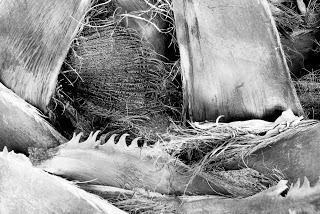 photo by T.R. Hummer
photo by T.R. Hummer9/9/10
The emissary is breakfasting. A rasher of bacon and a boiled egg have been brought to him on nickel plates, along with a mug of steaming tea. He eats contemplatively, the food vanishing in a slow, steady rhythm. Thus he pays homage to the food he eats. It is a sign from the Emperor that he has not been entirely forgotten. Over his head hangs a painting of the Emperor. The Emperor and the emissary have the same face. So does the woman who walks by with a jug of...
Published on September 09, 2010 17:49
September 8, 2010
Emissary (III)
 photo by T.R. Hummer
photo by T.R. Hummer9/8/10
When I leave the house, I register the not-unexpected fact that the pile of bundled palm fronds is still where we left it. Bulk garbage pickup arrives when it arrives, and will be no more hurried than the gods or the weather. The fronds appear unchanged, but that is a fiction arising from the limits of my powers of perception. Expressions of the landscape, they hold their piece of ground.
*
My river, when I was a boy, was called the Noxubee, a Choctaw word that means "...
Published on September 08, 2010 19:24
September 7, 2010
Emissary (II)
 9/7/10
9/7/10We dragged the bundled palm fronds, dusty and insubstantial, to the front of the house, for bulk garbage pickup. There was also a large, heavy old storm door, taller then I am by two feet and made of metal, that we had no use for. I took that out and put it on top of the fronds, as a sort of paperweight. Ten minutes later when I went back outside, the storm door was already gone, snagged by a junk scavenger. Travel light, Pilgrim. The heavy ones go first.
*
The emissary's mission is...
Published on September 07, 2010 17:51
Emissary (I)
 Photo by T.R. Hummer
Photo by T.R. Hummer9/6/10
S. and I were cutting dying fronds from the palm in the back yard. I felt a bolt of hot empathy for the trimmings.
*
I am saying goodbye to everything. It will be a long, lingering goodbye, most likely. But I am going. It's not correct to say that my going is "beginning" now; it began before I was born: like everyone's; like everything's. It is rather a question of time, or of timing. One month ago, I passed my 60th birthday; I must now think of myself as an old man.
*
A...
Published on September 07, 2010 14:46
October 29, 2009
A Note To Scott Olsen, Editor of Ascent, on the Publication of the First All-Online Issue of That Magazine

http://physics.weber.edu/carroll/archimedes/crown.htm
Hi, Scott, hi Ascent, bon voyage old wine in new bottles, or maybe that's old photons in new circuit boards:
I'm the last person who should be responding to your questions, or harmonizing with your meditations. I have spent an unconscionably large hunk of my professional life doing lit mag editing old school. At the same time, I'm the guy who weaned The Georgia Review off letterpress, and introduced computers into its hoary penetralia. (No t...
Published on October 29, 2009 17:14
August 30, 2009
Available Surfaces VII: In the Palm of the Poet's Hand
 St. Thomas Aquinas, by Franceso de Herrera
St. Thomas Aquinas, by Franceso de Herrera
Ron and Ruth were talking about Thomas Aquinas. As soon as we walked through the door, after Ron introduced Ruth and me very briefly, Ron had said, “Ruth, there’s a question about Aquinas I’ve been wanting to ask; let me ask before I forget.” And then the two of them were off and running into a theological thicket where I could not follow and frankly did not want to.
Nothing against the Heavenly Doctor, mind you: I’ve read a pound or two of Aquinas in my time, though I’ve never found him terribly appealing (Augustine and Duns Scotus are more my speed, not that it’s a horse race). But Ron’s question was something very specific about a particular passage in the Summa Theologica. I was lost before the question was out of his mouth. Ruth, on the other hand, rode it like a surfer rides curl; she could quote chapter and verse, and pursued the problem Ron raised as adeptly as a trained theologian. As we sat down, the small room filled with the intensity of their talk. Ignored for the moment—for about twenty minutes in fact—I looked around.
Out the casement window several ragged-looking palm trees were visible. Beyond them there was a brightening of the air, a sort of aura, that indicated water that I could not see from here; we were not far from the shore. This description might indicate we were in a balmy sub-tropical region, but in fact it was Weymouth in the United Kingdom; the water just out of sight below the window frame was the English Channel. As Ron and I had driven into Weymouth, I had noted the presence of palm trees along the beach with surprise: this hardly seemed the place for them; and indeed they hardly seemed to be prospering. Yet there they were—and they were just one among many surprising things about this place, and this day.
We were in the living room of a modest flat, what in the UK is known as a “bedsit”: an apartment consisting of a living area/kitchen, a bedroom, and a bath. It was sparsely but comfortably furnished, and completely anonymous, except for the fact that the rectangular area in which we sat was completely lined with built-in bookshelves: cabinets below, and shelves to the ceiling, all filled with well-used books. I naturally began to scan titles. There was a heavy preponderance of theological books and related philosophical titles (one shelf sagged under thick Aquinas tomes). There was also an extensive and eclectic, but poetry heavy, collection of literary titles; Gerard Manley Hopkins was especially well represented.
As Ron and Ruth talked on—he in his quiet Oxbridge/Irish accent, she in her working class London one—I fell into a sort of fugue state. It had been a fascinating day. I was near the end of an eleven-month residency in Devon, where I’d been teaching at the University of Exeter; Ron Tamplin was my colleague there, a poet who taught literature. He was an erudite man of great personal sweetness and charm, and we’d become fast friends; today, as a farewell gesture, he was taking me on a tour of places he thought I ought not to miss.
*
We’d driven first from Exeter to East Coker, and paid a visit to T.S. Eliot where his ashes are interred in the austere St. Michael’s, commemorated by a plaque on the wall (“In my beginning is my end, in my end is my beginning”). From there we made our way to Stinsford to pay homage to some of the remains of Thomas Hardy. As is well known, only his heart is buried there, in his first wife Emma’s grave and in the soil of the Dorset he loved, while the rest of him is in Poet’s Corner in London. Emma lies under a dignified white monument, on the end of which the presence of Hardy’s heart is indicated by an inscription which begins “Here lies the heart of Thomas Hardy” and ends “His ashes rest in Poets Corner, Westminster Abbey.”
As this was the second churchyard we’d visited within an hour or so, neither Ron nor I was anxious to linger once we’re looked over the stone and the grounds a bit.
As we walked back toward his car, Ron said, “Local legend has it that Hardy’s heart is not buried there at all.”
“What do you mean?”
“Well, they say that, after Hardy’s heart was brought down from London, it was placed in a pan on the kitchen table at his home nearby, and a dog ate it.”
“You’re joking.”
“I’m not saying it’s true, but it’s what people say.”
“So, what did they do?”
“The legend says they killed a sheep and buried its heart there instead.”
I paused, considering this. Then I said, “You’ve just revealed a vital difference between Americans and the English, Ron.”
“How so?”
“An American would have killed the dog that ate the heart, and buried the dog; that way the heart would actually be there.”
Ron nodded solemnly. “You’re right. And an Englishman would never kill a dog. For any reason.”
Years later, I ran across this legend again, in somewhat different form. This time it was a cat that ate the heart, and a pig was killed to replace it. I reject this variant on aesthetic as well as pragmatic grounds, but the other story I fully embrace, even though it is probably altogether a fabrication.
After we left Hardy, Ron drove me to see Maiden’s Castle outside Dorchester. Maiden’s Castle is a bewilderingly huge and complex Iron Age earthwork fort, complete with a maze; the only way in and out of the fort is through the maze. The highest ramparts are over twenty feet high, and the fort is built on a hill; there would have been wooden walls on top of the ramparts, so that defenders within, high above the maze entrance, could have attacked enemies easily as they stalled in the twisty passages below. Overall, in its magnitude and complexity, the forbidding strategy of its construction, Maiden’s Castle was a perfect objective correlative for Aquinas’s Summa Theologica.
*
The library in the Weymouth bedsit was not enormous, as the room was not very large, but it was splendid in its way. It contained many titles I would not, myself, have collected, but every book there was clearly weighty of content, carefully selected; furthermore, there was not a book on any shelf that did not show signs, even from where I sat, from long and careful use. This was not a casual collection, nor was anything present for show: this was a workroom, and the books were respected tools, well maintained but nonetheless worn with the work they had done. It was, in short, my favorite kind of library, one in which function—and hence thought and knowledge, not to say actual wisdom—is the only principal.
Charles Spurgeon, Sören Kierkegaard, Karl Barth, T.F. Powys—Powys! I’d read a couple of his weird, occult novels, but here were his theological works—and D.H. Lawrence: lots of Lawrence. And yes, here was the local copy of the Summa Theologica: a leather-bound set in five volumes, running I suppose to over three thousand pages, the spine of each creased with repeated opening and closing, the gold leaf titles worn by the touch of hands. The effect was vastly more pleasing than the look of brand new unread volumes. Suddenly seized with an unnatural desire to read every word of Aquinas’s masterwork, I was on the verge of jumping up from my chair and making a beginning.
But just then Ruth exclaimed, in her broad London accent, “But oh my, Ron, how rude we’re being! There’s Terry sitting, bored to tears with us, and we’ve forgotten why he’s come!” She leapt to her feet, stepped over to me, and took my hand. “Terry, now it’s time you met Jack!”
She turned me a bit in my chair by the force of her energetic enthusiasm, and suddenly I became aware that, sitting in the corner was a tiny man. “Tiny” is perhaps an overstatement, but his posture was so imploded by—what? inanition, or just gravity?—that he seemed to take up no space at all, and I had completely failed to notice he was there. He was neatly dressed in corduroys and a brown cotton shirt; he wore a corduroy cap. His hands were folded in his lap, and his head was inclined toward them. For all the notice he gave anyone or anything in the room, he might have been asleep.
“Ron!” Ruth exclaimed. Her voice was loud, with a Cockney edge that made it hard to ignore, but the main in the chair did not move a muscle nor turn a hair. “Ron, will you say hello to Jack?”
“Oh, Ruth, no,” Ron said, “I couldn’t. I’m no good at it.”
That response struck me as odd, but before I had time to inquire, Ruth said to me, “What about you, Terry? Will you say hello?”
“Of course I will,” I said. “But how do you do it?"
“It’s simple,” she said. She stepped across to the man and took his right hand in hers, holding it palm up. He allowed this gesture, which might to some have seemed an abrupt indignity, without protest or even visible awareness of it; he might as well have been a mannequin. “You take his hand like this, and then you take your finger and write whatever you want to say to him in big block letters, like so.”
Holding his hand, she wrote in his palm, saying slowly and loudly, for our benefit, the words she was writing: “J-A-C-K,” she said. “R-O-N A-N-D T-E-R-R-Y A-R-E H-E-R-E.”
Jack inclined his head slightly. Ron said, “Ruth, please tell him I say hello.”
“R-O-N S-A-Y-S H-E-L-L-O,” Ruth wrote and intoned. Jack again inclined his head; he fluttered his right hand weakly toward the room in general, a wave to Ron.
Ruth looked at me. “That's it,” she said, “easy-peasy. Fancy a try?”
And so I took Jack Clemo’s hand.
*
Jack Clemo is virtually unknown in the USA; I can’t recall speaking to anyone who has known his name. In the UK, he is not exactly famous, but he has a devoted following among poets and poetry lovers, perhaps chief among them my friend Ron Tamplin, who idolized him and loved him. It was Ron who—having first gauged my interest in and passion for such poets as Gerard Manley Hopkins and Eliot--had introduced me to Jack Clemo’s work, and as I had warmed to it, he promised me a trip to meet the poet.
In Clemo’s poems I discovered a gnarly, spiritual, formal sensibility akin to Hopkins in some ways and alien to it in others. Clemo’s life in no way resembled Hopkins’s; indeed it in no way resembled the life of anyone I could think of. And while Clemo’s poems are not “confessional”—indeed he often wrote dramatic monologues from the points of view of saints and others—his life, like the life of any poet, is richly implicated in his work.
Born in 1916 to working class Cornish parents, Clemo lost his father early on; his parents’ marriage was not a happy one, and Clemo’s father enlisted in
1917, never to be seen again. Reared among tin miners and clay-kiln workers (his father had been one), Clemo lived in the shadow of his mother’s rage toward his vanished father, and of her religious zeal. She was a “dogmatic Nonconformist,” a designation that, in early twentiety-century Cornwall, basically meant a strict fundamentalist Protestant, a Puritan of sorts, refusing to conform to the aegis of the Church of England.
Clemo was a brilliant boy, but sickly. At some point in his childhood—the few biographical accounts are at variance in dating these matters—he became ill with a disease that the Cornish doctors found mysterious. He had, at this stage, bouts of blindness, of deafness, and of paralysis which came and went unpredictably and, evidently, untreatably. At the age of 13 he was taken out of the public schools, being deemed too sickly to remain; what became of his education beyond that point is hard to say, but my assumption is that he was from that point forward self educated; he never attended university. Somewhere along the way he read D.H. Lawrence, and found validation both in Lawrence’s genius and in his background. Like Lawrence, he set out to write both fiction and poetry; he published a novel, Wilding Graft, in 1948, and in 1949 a memoir, Confession of a Rebel.
In the meanwhile, when he was twenty, the deafness that had sporadically plagued his boyhood became permanent. Blindness continued to come and go, but in the mid-1950s it came and stayed, so that by the age of 40 Clemo was both deaf and blind. From then on, though he published more prose, his output was primarily poetry; his bibliography lists ten volumes.
For me, Clemo’s work is remarkable—beyond the fact that he was able to write it at all—for the incisiveness of its spiritual quest, for its closeness to the weird Cornish landscape and Cornwall’s working class, and for its formal beauty. Like many blind poets (think of Borges in his old age), Clemo gravitated to traditional versification and fixed forms, though likely even had he kept his sight he would have written that way: it suited him (copyright issues make it impossible to quote Clemo poems online; I refer the reader to his or her own resources to discover his powerful and fascinating corpus, but in the US it’s hard to find; my university library contains not a word of Clemo).
*
At 72, when I met him, Jack Clemo had small, even delicate hands that showed little sign of his working class background. I don’t know to what extent the young Clemo was able to engage in manual labor; if he’d been able to do it, he’s have done it, but his illness may have kept him from it. Photos of Clemo from various times in his life, paradoxically, show a robust, even elegant-looking man, but the Jack Clemo I met was neither. What the state of his health was then I don’t know, but he had only six more years to live, and seemed older and more frail than his age.
Ruth said to Jack: “T-E-R-R-Y W-A-N-T-S T-O S-A-Y H-E-L-L-O.” Clemo gave his small quick nod.
In the palm of his right hand, I wrote, more slowly and deliberately than Ruth had done, “Mr. Clemo: I admire your work very much, and I’m very glad to meet you.” Clemo closed his hand, took it from me, and placed it in his lap again; otherwise, he didn’t react.
I said to Ruth, “I’m not certain I did that right.”
“Let me see,” Ruth said. She was utterly cavalier about her handling of Clemo; she snatched his hand up again and said “T-E-R-R-Y S-A-Y-S H-E A-D-M-I . . . .”
Before she’d finished, Clemo snatched his hand away again. In a firm, resonant, somewhat too loud voice, he declared, “I know what Terry said!”
Of course, of course, of course: he could speak perfectly well. Up until that moment, he had simply chosen not to do so.
*
From that point until Ron and I departed a couple of hours later, the conversation became general, as they say in old novels, and animated. Clemo was a very eloquent man. Ruth pulled a chair beside him, held his hand in his, and translated at breakneck speed whatever any one of us said; likely she and Clemo had evolved a shorthand of some kind over the many decades of their marriage. Ron and I had a good many things to ask, and it was not long before I felt, as Ron so clearly had for a long time before, that I had met one of my Maestros.
I had questions about his process: how he wrote. He wrote on an old manual typewriter that he’d had for ages; he pointed to where it sat on a small typing table in the corner. He didn’t want a new one; he knew the touch of this one too well for that. Did he revise? Of course! Did Ruth read drafts of his poems back to him? No, he remembered them. “He remembers them all,” Ruth said. “He can go back six drafts and pick up a variation on a line.” Did Ruth proofread his work for him? Yes, but it was hardly necessary. “He never makes a mistake,” Ruth said.
His was a prodigious memory. Ron, being encyclopedically familiar with Clemo’s poems, at one point said, “Ruth, there’s a poem of Jack’s that I saw years ago in a magazine, but I don’t think it’s ever been in one of his books; I wonder if you have a copy,” and he told her the title. “I don’t know,” Ruth said, “but Jack will.” She wrote quickly in his palm, and he lit up. “Ah!” he exclaimed. “You remember that orphan, do you! I like that one as well. Yes, I have it. Just a second.”
For the first time, he rose from his chair. He walked directly across the room. Beneath the bookshelves on that side, there were four double-doored cabinets, eight doors in all. He opened the fifth door from the left. The whole cabinet was filled with boxes of the sort that reams of typing paper come in, all exactly alike. He knelt down and counted, feeling as he went: three rows over, five boxes down: this one! He opened the box, which was filled with what might have been a ream of typing paper, except every sheet had a poem on it. He pulled out the ream and quickly counted his way into it. Aha! There you are; this is the one you want.
“Yes,” Ron said, “that’s it.” It was like a magician’s card trick, except that for Clemo, it was just the way he was in the world. There ensued a lengthy conversation about the poem, which was about, yes, Thomas Aquinas.
Hearing that name again, I looked up again at the five volumes, the three thousand pages, of the Summa, and suddenly a lightning bolt hit me. How did Ruth Clemo know so much about Thomas Aquinas? Ron had told me that Ruth was just what she seemed: a working-class Cockney woman from inner-city London. Arguably the most intelligent person in the room, Ruth had no doubt been denied, like Clemo, access to higher education; she and Clemo had married in 1968, long after the doors of Clemo’s perception had shut down for good. I have no idea what the course of their reading was like, before that date or after it, but the evidence of that edition of the Summa seemed clear enough: someone’s hands had worn that gold leaf away; and the freshness of both Jack’s and Ruth’s acquaintance with the material made it clear that the last reading of it was not so very long ago.
If you write every word of every page of the three thousand pages of Aquinas’s Summa into the palm of someone’s hand, by the time you are done, you are an expert. Whether or not Jack Clemo would be able to leap up and leaf instantly to a given argument of Aquinas’s on page 2,356 of that work, I don’t know, but I’d bet my life that Ruth could.
Jack and Ruth Clemo had whole libraries, whole lives, written in their hands.
Here was the great lesson of this journey, the beautiful gift Ron Tamplin wanted me to take away. What Jack and Ruth held in their hands was what every poet ought to have: the world’s poetry, and—whatever you may mean by the word—God’s, written letter by letter in the skin: thus earned.
*
At a certain point, it became clear that Jack was restless. “Ah, it’s time for Jack’s walk,” Ruth said; “he has to have it every afternoon.”
And as it was getting late, Ron and I agreed we would walk the Clemo’s out, then return to the car for the drive home.
It was a beautiful late spring day, and the sun was low in the sky. We walked alongside the Clemos; Ruth was tucked snugly against Jack, protectively I thought, but it hardly seemed necessary; Jack clearly knew exactly where he was and where he was going. We were chatting about nothing as we walked; Jack alone was silent. Suddenly he shook himself loose from Ruth, turned at a smart right angle, and walked off the sidewalk out onto a lawn. He took four steps, paused, and then held out both hands, forming a circle with his thumbs and his middle fingers. It was for all the world as if he were about to put an invisible crown on the head of an invisible king who knelt before him.
I said, “What’s he doing, Ruth?”
“Ah,” she said. “There was a storm a couple of weeks ago. His favorite palm tree was right there where he’s standing. He’s saying farewell to it.”
Looking down, I could see the remnant of the tree, sawed off flush with the ground. The placement of his hands was exact: if the tree were still where it once stood, his hands would encircle it perfectly.
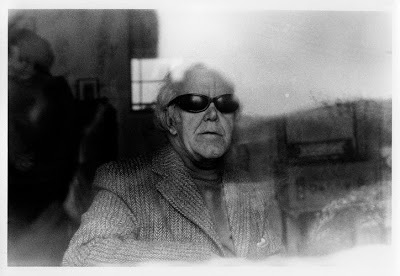 Jack Clemo: photo by Tricia Porter
Jack Clemo: photo by Tricia Porter
Published on August 30, 2009 09:03
August 29, 2009
Available Surfaces VI: Writ in Water
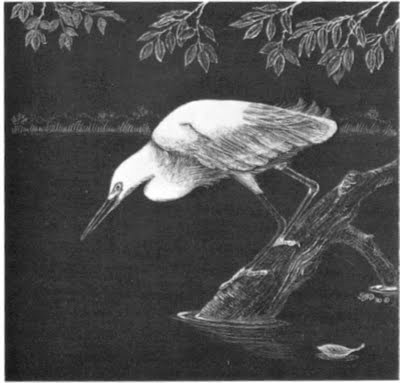 Cattle Egret
Cattle Egret
The place I spent my boyhood was landlocked; we were far from the ocean, and from any other kind of major body of water, whether significant lake or river. There were not even streams in that terrain: the water table was deep and did not break through the deep and fertile layers of soil laid down there millennia ago when our region was a shallow sea. Once those waters departed, there was nothing to replace them except what fell from the sky. The rich soil was not colonized...
Published on August 29, 2009 19:14
August 28, 2009
Available Surfaces V: Can Teaching be Written?
Emerson Lecturing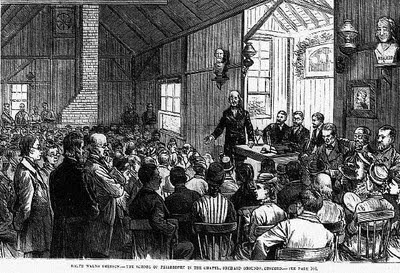
"I hear and sometimes share some fundamental objections. Creative-writing programs and workshops are a commodification of the art. They attempt to express or enact something that is finally and importantly solitary. They water down our sensibilities, as they corrupt the notion of individual style. You simply can't teach vision, so you can't teach creative writing.Well, can you?What happens in a creative writing classroom?"--David Baker,
Published on August 28, 2009 09:44
August 27, 2009
Available Surfaces IV: Earth Angel
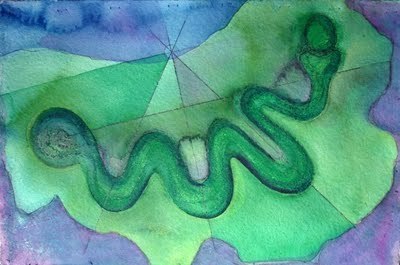 Ohio Serpent Mound
Ohio Serpent Mound". . . .for beauty is God's handwriting." --Ralph Waldo Emerson
The first time I flew to England, I woke up from a troubled airplane sleep and looked out the plane's porthole. We were over Ireland, the pilot announced, still pretty high but beginning to descend. I was struck immediately by the clarity of definition of the fields below. I don't mean that they were in some way better focused then what I was accustomed to seeing from the air in the USA; I mean that their edges...
Published on August 27, 2009 11:57



